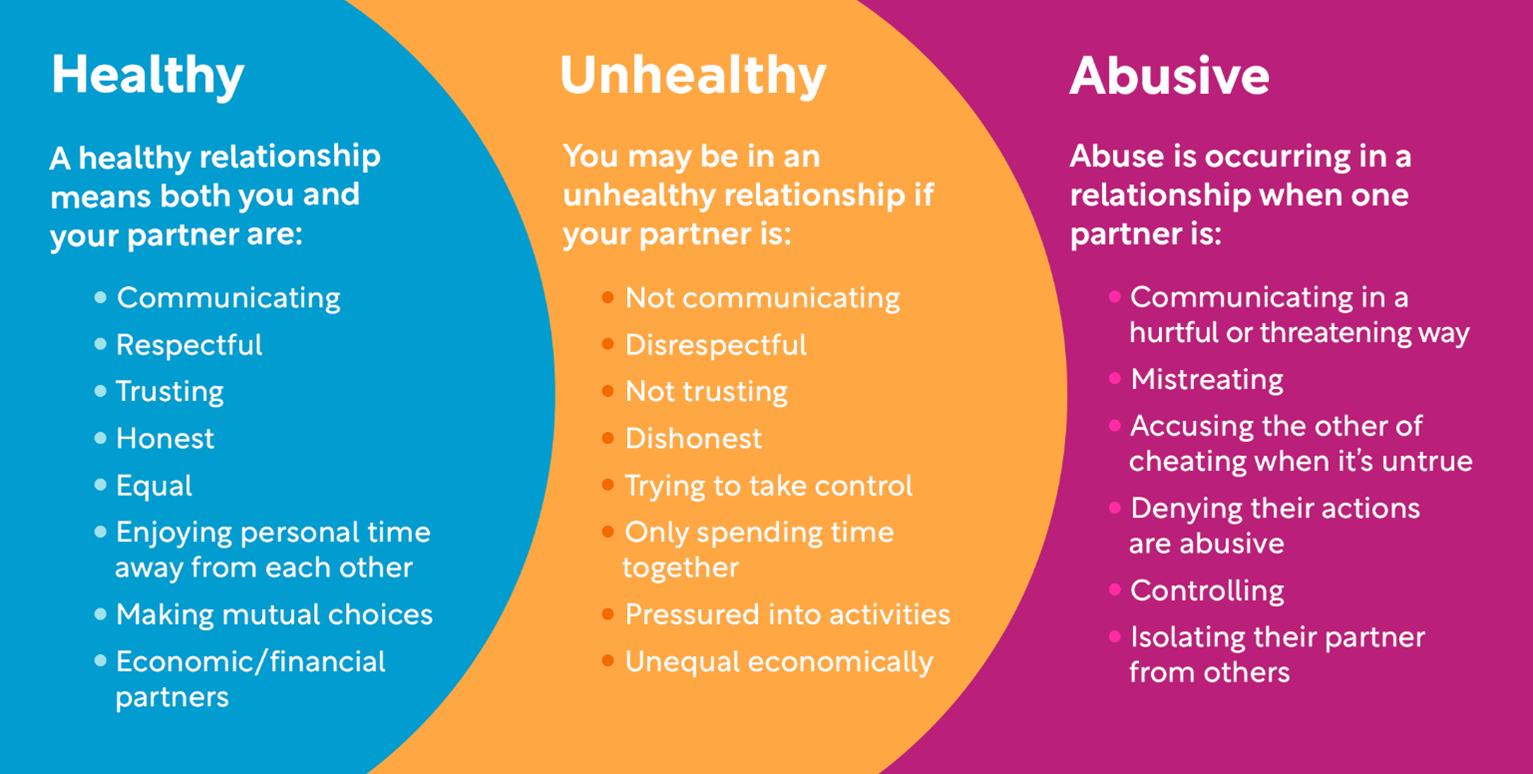Relationship Health
Home State Health wants you to know that bringing healthy relationships into your life is important for you and your family’s health and safety.
See where your relationships fits in on the relationship spectrum below:

National Domestic Violence Hotline. (n.d.) Relationship Spectrum. Love is respect.
What is Domestic Violence?
Domestic violence is the willful intimidation, physical assault, battery, sexual assault, and/or other abusive behavior as part of a system pattern of power and control by one intimate partner against another. It includes physical violence, sexual violence, threats, and emotional abuse. The frequency and severity of domestic violence can vary.
Signs of Domestic Violence
- Extreme jealousy, often with accusations of cheating
- Embarrassing or shaming you
- Controlling who you spend time with or talk with
- Regularly putting you down and slamming you
- Blaming you for their behavior
- Denying or dismissing their actions against you
- Controls all the money, or possibly refuses to give you money for expenses
- Physically hurts you or threatens to do physical harm to you or other members of the family
Types of Domestic Violence
- Verbal and psychological abuse
- Physical violence
- Unwanted sexual contact
- Threats and fear
- Neglect
- Withholding medications
- Physically harming service animals
- Shutting away victims
- Withholding victims of necessary physical accommodations
- Withholding or destroying assistive devices such as wheelchairs
- Control over your money
You May Not Realize
- You can contact The Domestic Violence Hotline at any time to help figure out the health of your relationship
- Abuse can be more than emotional and physical. Sometimes we may not realize a partner’s jealousy or controlling behavior can be common warnings signs. Check out the Power and Control Wheel to learn more about other types of abuse
- Someone with an abusive partner that has access to guns is much more likely to be killed and people who have been strangled by a partner in the past have a much higher risk of being killed by that partner
- It can take an average of 7 times to leave an abusive partner. The resources you reach out to know that it can be difficult to leave a partner for many reasons, and they are there to support you and help with your safety, whichever way is best for you.
- One out of three women and one out of four men in the United States have experienced some form of physical violence by a partner.
- Few people in LGBTQIA+ community who experience dating violence rarely report the abuse
- Abuse before, during, or after pregnancy can have lasting impacts on the health and well-being of you and baby
- One out of six people each year experience abuse for the first-time during pregnancy
- Women with disabilities experience intimate partner violence at twice the rate of other populations
- Women with disabilities may feel more isolated than women without disabilities and feel they cannot report abuse as they may be dependent on the abuser for their care.
- 12% of people in the US have disabilities, yet from 2017-2019, persons with disabilities were victims of 26% of nonfatal violent crime.
- 19% of rapes or sexual assaults against persons with disabilities were reported to police, compared to 36% of those against persons without disabilities.
- Children who see abuse are at higher risk for: becoming victims of abuse by their abusive parent, depression and behavioral, developmental and physical health concerns, even later in life
- 275 million children are currently exposed to domestic violence worldwide.
How To Prepare
- Individual decision
- Create a plan for leaving
- Keep any proof of the physical abuse and take it with you
- Get a bag together that can easily be obtained when leaving
- Leave when the abuser will least expect it
- Call the police before leaving
Not Sure if Your Relationship is Healthy? Take This Quiz

Check Out This List of Confidential Resources
Are you worried that you or someone you know might be in an unhealthy relationship?
- 24/7 National Domestic Violence Hotline Call/chat/text
- Rape, Abuse and Incest National Network’s (RAINN) National Sexual Assault Hotline: Call 1-800-656-4673
- National Maternal Mental Health Hotline: Call or text 1-833-943-5746
- Missouri Crisis Hotline: Call or text 988
- Download the MyPlan app
- Legal Services of Missouri: For no cost support with protective orders and more
- Get a Safety Plan: Relationship Abuse Safety Planning
- Safe at Home A program to keep your mail/address secure
- Abused Deaf Women’s Advocacy Services
- National Deaf Hotline
- End Abuse of People With Disabilities | Intersectionality, Disability and Victimization
- Talk to your healthcare provider’s office and to your Home State Health Care Manager for support
Approval Code: HSH25102; SMHK25084
Approval Date: 10/22/2024

